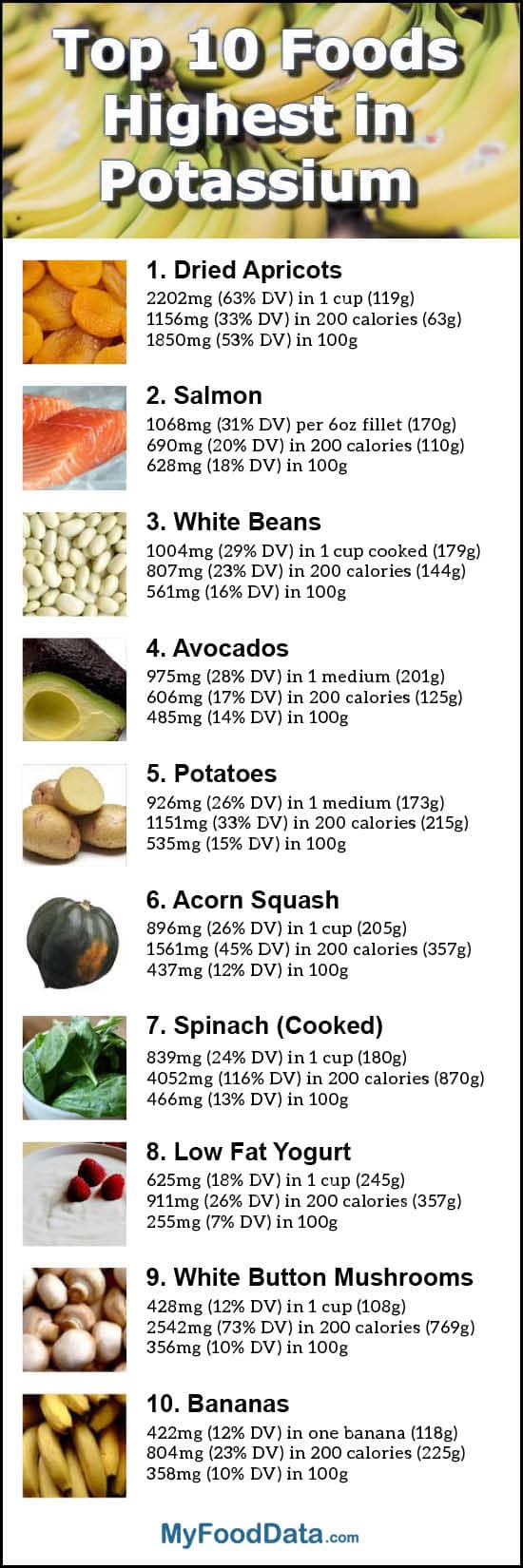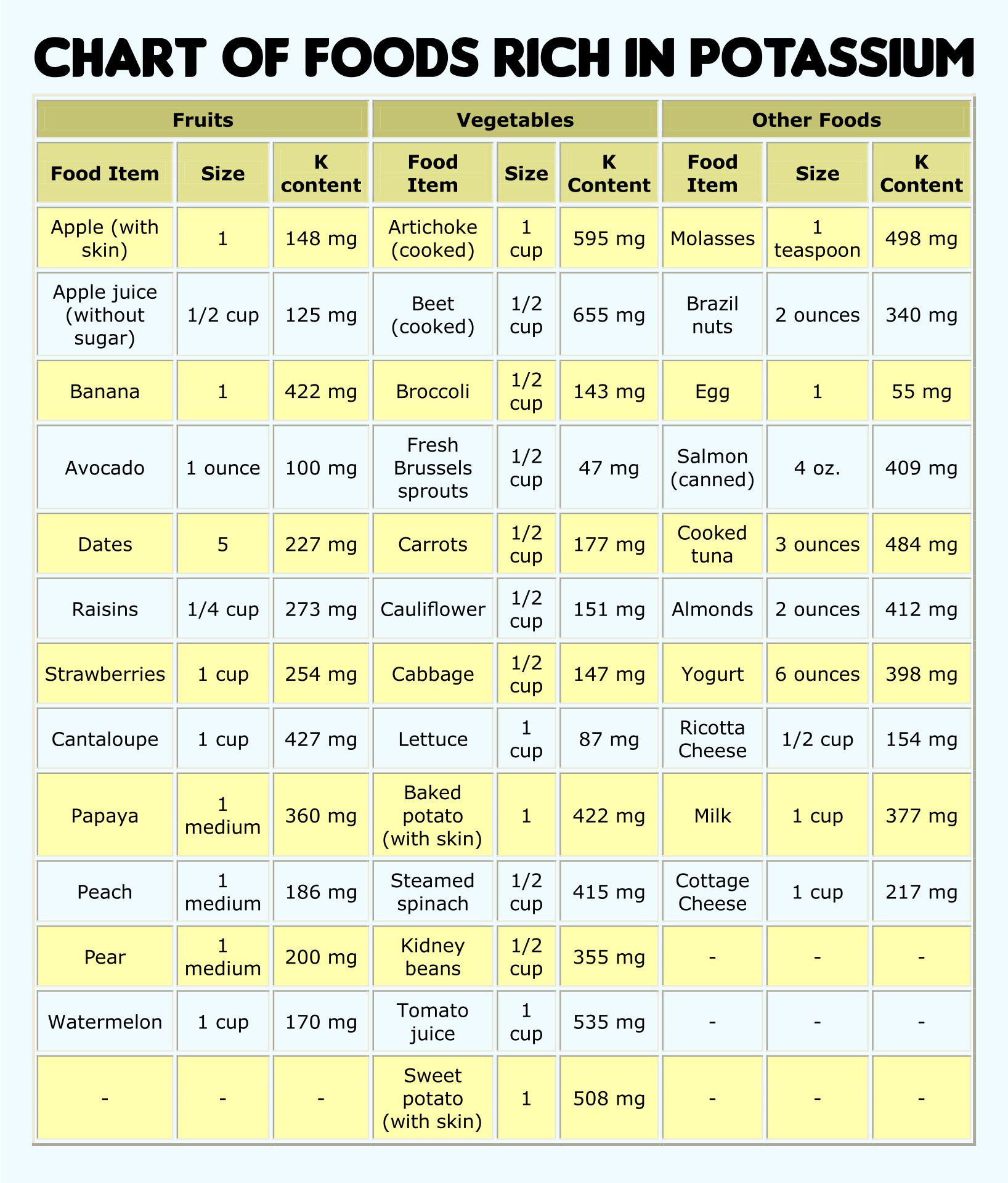Do you want to know which foods are rich in potassium? If so, you’ve come to the right place! In this article, we’ll delve into the topic of potassium-rich foods and explore the benefits of including them in your diet. So, grab a cup of coffee and let’s dive in!
What is Potassium?
Potassium is an essential mineral that plays a crucial role in overall health and well-being. It is classified as an electrolyte, which means it helps conduct electrical impulses in the body. Potassium works closely with sodium to maintain fluid balance, nerve function, and muscle contractions.
The Importance of Potassium
Having adequate potassium levels in your body is vital for various reasons. Here are some of the key benefits:
- 1. Regulates Blood Pressure: Potassium helps lower blood pressure by counteracting the effects of sodium. It relaxes the walls of blood vessels, promoting healthy blood flow.
- 2. Supports Heart Health: Adequate potassium intake can reduce the risk of cardiovascular diseases, such as stroke and heart attack.
- 3. Enhances Muscle Function: Potassium is essential for proper muscle contraction and relaxation, making it particularly important for athletes and individuals who engage in regular exercise.
- 4. Maintains Electrolyte Balance: Potassium, along with sodium, helps maintain the balance of electrolytes in the body. This balance is necessary for optimal cell function.
- 5. Supports Bone Health: Adequate potassium intake may help reduce the risk of osteoporosis and maintain overall bone health.
- 6. Improves Kidney Health: Potassium plays a role in preventing the formation of kidney stones and maintaining proper kidney function.
Top Potassium-Rich Foods
Now that we understand the importance of potassium, let’s explore some of the top foods that are rich in this essential mineral:
1. Bananas
 When you think of potassium-rich foods, bananas probably come to mind first. They are not only delicious but also a great source of potassium. Incorporating bananas into your diet can help increase your potassium intake.
When you think of potassium-rich foods, bananas probably come to mind first. They are not only delicious but also a great source of potassium. Incorporating bananas into your diet can help increase your potassium intake.
2. Avocado
 Avocado is a popular fruit known for its healthy fats and various nutrients. It is also a fantastic source of potassium, making it a great addition to your meals or as a spread on toast.
Avocado is a popular fruit known for its healthy fats and various nutrients. It is also a fantastic source of potassium, making it a great addition to your meals or as a spread on toast.
3. Sweet Potatoes
 Sweet potatoes are not only delicious but also packed with nutrients, including potassium. Roasted, mashed, or baked - there are countless ways to enjoy this versatile vegetable.
Sweet potatoes are not only delicious but also packed with nutrients, including potassium. Roasted, mashed, or baked - there are countless ways to enjoy this versatile vegetable.
4. Spinach
 Popeye knew what he was talking about! Spinach is a nutrient powerhouse and an excellent source of potassium. Add spinach to salads, smoothies, or sauté it with some garlic for a tasty side dish.
Popeye knew what he was talking about! Spinach is a nutrient powerhouse and an excellent source of potassium. Add spinach to salads, smoothies, or sauté it with some garlic for a tasty side dish.
5. Coconut Water
 Looking for a refreshing and hydrating drink that’s also high in potassium? Look no further than coconut water! It’s a natural source of electrolytes and an excellent option after a workout.
Looking for a refreshing and hydrating drink that’s also high in potassium? Look no further than coconut water! It’s a natural source of electrolytes and an excellent option after a workout.
6. White Beans
 White beans, such as cannellini beans, are not only creamy and delicious but also incredibly nutritious. They are rich in potassium, fiber, and protein, making them a fantastic addition to soups, stews, or salads.
White beans, such as cannellini beans, are not only creamy and delicious but also incredibly nutritious. They are rich in potassium, fiber, and protein, making them a fantastic addition to soups, stews, or salads.
7. Salmon
 Salmon is not only a great source of omega-3 fatty acids but also a good source of potassium. Enjoy grilled or baked salmon for a healthy and potassium-rich meal.
Salmon is not only a great source of omega-3 fatty acids but also a good source of potassium. Enjoy grilled or baked salmon for a healthy and potassium-rich meal.
8. Yogurt
 Yogurt is a versatile dairy product that provides probiotics and various essential nutrients, including potassium. Choose plain Greek yogurt or opt for flavored options with no added sugars.
Yogurt is a versatile dairy product that provides probiotics and various essential nutrients, including potassium. Choose plain Greek yogurt or opt for flavored options with no added sugars.
9. Tomatoes
 Tomatoes are not only delicious but also an excellent source of various vitamins and minerals, including potassium. Use fresh tomatoes in salads, sandwiches, or enjoy them in pasta dishes.
Tomatoes are not only delicious but also an excellent source of various vitamins and minerals, including potassium. Use fresh tomatoes in salads, sandwiches, or enjoy them in pasta dishes.
10. Apricots
 Apricots are a sweet and juicy fruit packed with potassium and other essential nutrients. Enjoy them as a snack, use them in baking, or add them to salads for a burst of flavor.
Apricots are a sweet and juicy fruit packed with potassium and other essential nutrients. Enjoy them as a snack, use them in baking, or add them to salads for a burst of flavor.
These are just a few examples of potassium-rich foods that you can incorporate into your diet. Remember, a varied and balanced diet is key to ensuring you meet your nutritional needs.
How Much Potassium Do You Need?
The recommended daily intake of potassium for adults is approximately 2,600–3,400 milligrams (mg) per day. However, individual needs may vary based on various factors, such as age, sex, and overall health.
If you have specific dietary concerns or health conditions, it’s best to consult with a healthcare professional or a registered dietitian to determine the appropriate potassium intake for you.
Conclusion
Potassium is an essential mineral that plays a crucial role in maintaining overall health and well-being. Including potassium-rich foods in your diet can have numerous benefits, such as regulating blood pressure, supporting heart health, and enhancing muscle function.
So, why not start incorporating more potassium-rich foods into your meals? Whether it’s enjoying a banana as a snack or adding spinach to your omelet, small changes can make a big difference in your overall health.
Remember, it’s always important to strive for a balanced diet that includes a variety of nutrient-rich foods. Your body will thank you for it!